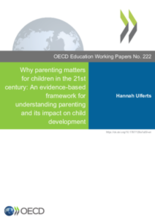Displaying 131 - 140 of 947
The aim of this study was to investigate counselors’ and caregivers’ experiences with Project Support (PS) in Sweden, a program designed for families with children who have been exposed to intimate partner violence (IPV).
The authors of this study conducted a qualitative case study and obtained in-depth knowledge about the necessary professional competencies from the perspective of financiers, providers, practitioners, and participants across three cases of family and parenting support programmes in Germany and the Netherlands.
In this commentary piece, Aisha K Yousafzai - of the Department of Global Health and Population at the Harvard TH Chan School of Public Health and the and Department of Paediatrics and Child Health at Aga Khan University - notes that "the evidence presented [in the Lancet Group Commission on the institutionalisation and deinstitutionalisation of children] and their call to action to ensure abandoned children can thrive in family-based care environments rather than in institutions matters now more than ever as the global community addresses unprecedented challenges to ensure a generation of children are not left behind with respect to their survival, health, development, learning, and safety."
This study investigated process and outcomes of the Parenting for Lifelong Health (PLH) for Young Children and for Adolescents programs implemented as part of routine service delivery in postconflict settings.
This study utilizes a qualitative interview-based design to understand how the the interdisciplinary law office approach to parental representation in child welfare, used in the New York City Family Court, works in practice to impact the outcomes of families’ cases.
This paper provides a structured overview of the existing parenting literature with the aim of developing an evidence-based and culture-sensitive framework of parenting and its influence on child development.
For this study, in-depth interviews with 17 currently or recently-involved parents in a Midwestern U.S. family treatment court, which are specialized child welfare dockets designed to address substance use, were conducted and analyzed using constant comparative coding, in order to understand parents’ perspectives on their own substance use, including its impact on their parenting, before and during child welfare system involvement.
This study explores how sub-Saharan African migrant parents and caregivers navigate parenting between the cultures that have shaped their lives and parenting expectations within the new environment.
The purpose of this study was to examine the impact of a peer-delivered detection and active outreach program upon depression and engagement in mental health services among caregivers involved in the child welfare system.
The current study uses two randomized control trials, one conducted with foster caregivers and one conducted with birth parents, to investigate the longitudinal effects of caregiver type (foster versus birth parent) and a home-visiting parenting intervention on emotion regulation among young children referred to Child Protective Services (CPS).

